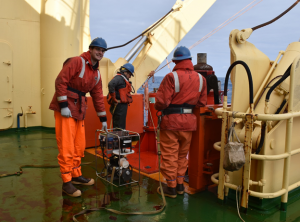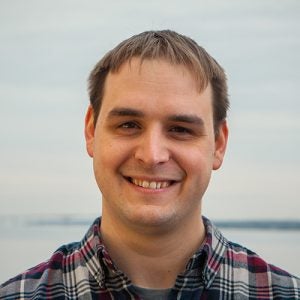May 8, 2020
Welcome to our new series: GSO Profiles! Each post will feature a brief interview with a member of the GSO community. To get us started, our first profiles will be of GSO students who either graduated this past December or will this month. These profiles are one way we can celebrate the accomplishments of those graduating in this unusual time of COVID-19, and also welcome them to the ranks of GSO alumni!
We are starting our series with Colin Jones, who has the distinction of being the first person at GSO to defend his Ph.D. dissertation virtually. His major professor is GSO professor Rebecca Robinson. Also on his committee were GSO professor Tatiana Rynearson and Geosciences professor Simon Engelhart. The focus for his Ph.D. in Oceanography was paleoceanography. Colin grew up in Seattle, Wash. then went to Willamette University in Salem, Ore. for his undergraduate studies. He said, “I grew up around the ocean and mountains, so no surprise I ended up in Rhode Island.” Here’s Colin, in his own words:
GSOP: Tell us about your research at GSO: what question(s) are you trying to answer?

CJ: Paleoproxies are biogeochemical tools that we use to understand the ocean in the past—my work focused on improving our understanding of one such proxy! We are interested in how the Southern Ocean around Antarctica responded to and controlled past climate shifts, and we can use the chemistry of fossil diatoms (tiny, single-celled and glass-shelled marine plants) to help determine changes to oceanographic conditions in the past.
GSOP: What is your favorite thing about your work?
CJ: With paleoceanography everything is collaborative, and most of your data are a result of years or decades of many people making many different measurements. Those results are puzzle pieces and adding your own puzzle piece of data and putting together a conceptual framework just the right way so that the whole system makes sense is complex, interesting, and very fun!
GSOP: What led you to your studies/career in ocean science?
CJ: My undergraduate degree was in chemistry, and I enjoyed learning about the environmental applications of chemistry, so I jumped at the chance to explore more with an oceanography Ph.D.
GSOP: What brought you to GSO?
CJ: Largely the people—I was very comfortable with the community at GSO during my visit and had some great, scientifically interesting conversations with my major professor even as a prospective student. Also, I knew my project here would revolve around a Southern Ocean research cruise, and that is just straight-up cool!
GSOP: How have the COVID precautions affected you? What was it like defending your dissertation virtually?
CJ: My defense was one of the first to be held digitally due to the COVID restrictions. In part it was great since friends and family from all over the country could join in and be a part of the day. On the other hand, the celebrations have remained deferred, which has been a bit of a bummer. On the whole I was lucky to be at a stage of my degree where the work could go on from home – it is much harder on those just getting into the lab and those with time-sensitive, critical sampling seasons.
GSOP: Who have been your role models or mentors?
CJ: My advisor, Dr. Becky Robinson, has been my biggest role-model on campus, but I have also taken cues from many people on campus including too many professors to name who fostered great discussions about oceanography and life. I have also admired folks in public communication and engagement roles like Dr. Sunshine Menezes, Executive Director of the Metcalf Institute at URI, and those who look after the students like our Associate Dean Dr. David Smith.
GSOP: What do you do for fun?
CJ: I have enjoyed exploring Rhode Island via local breweries with friends and playing beach volleyball during the summer. Getting outdoors and hiking up in New Hampshire and Maine is great when I need to get away for a while. Reading and video games have also helped keep me sane during my PhD process!
GSOP: What is your favorite spot or view at GSO?
CJ: The view from the roof of CACS (Center for Atmospheric Chemistry Studies) is a great one, with the entire campus plus the docks in sight!

GSOP: What is your advice for someone considering ocean science for their academic/professional career?
CJ: The applications and where you can go with ocean sciences are hugely varied, so I think it is a great field to jump into and explore—you’ll find your niche and thrive if you’re interested in science, policy, environmental management, and more! Plus, the ocean is awesome. If you are aiming for an advanced degree, make sure the people you meet are the people you want to be around daily for the next few years—they are the ones who will support you, and the ones you will support too!
